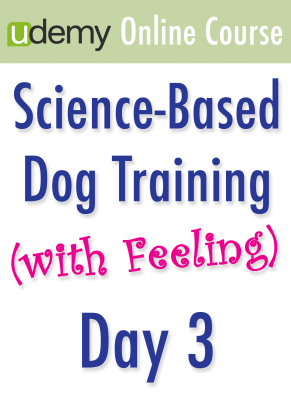Science-Based Dog Training (with Feeling) - Day 3

Day 3 - Off-leash Verbal Control with Distance and Distractions: Phasing out Food Lures and Rewards and Naturally Motivating your Dog to Perform Quickly, Reliably and Willingly
This seminar will teach you how easy it is to phase out food lures and rewards scientifically, how to motivate your dog with much more powerful life rewards, interactive games and the seven big behavior “problems” and how to empower a secondary reinforcer as the most powerful reinforcer.
Training is about first teaching your dog WHAT to do but then motivating him to WANT to do what you want him to do. This seminar will teach you neat tricks so that your dog may chill and relax for most of the time but instantly respond with extremely high levels of reliability following your softly-spoken verbal cue.
A trained dog is one that has been taught to respond happily and willingly when off-leash and distracted (as they often are at home) and without the continued need for any training tool. Unfortunately, few dog owners get beyond the beginning stages of training. Few dog owners are taught how to phase out training tools, how to motivate their dogs to want to comply, or how to reduce and eliminate undesirable behavior.
Food lures should be phased out during the very first session (and replaced with handsignals and eventually, verbal commands). However, many owners are still luring with food after weeks and weeks of training. Similarly food rewards need to be phased out within a few weeks and replaced with much more powerful rewards. In some classes there is no attempt to phase out food lures, clickers or food rewards. Consequently, many dogs only respond if they are on-leash, or if the owner has a lure or clicker in their hand and food in a pouch. By this time, effective luring and effective reinforcement has become bribing and the dogs’ attentiveness and response-reliability takes a nose-dive.
Luring allows us to predict precisely when the dog will perform desired behavior, consequently, lure-reward training enables us: to begin to associate the verbal cue with the required behavior from the very first trial, to teach hand-signals within a dozen trials, to implement differential reinforcement from the second trial, and to teach the verbal cues for several behaviors at the same time. Moreover, phasing out food lures (and food rewards) is quicker than phasing out (hand, leash, or collar) physical prompts.
Topics Include:
The Pros and Cons of the five most commonly used reward-training techniques: physical prompting, lure/reward training, shaping (clicker training), all-or-none reward training and autoshaping.
The principles and process of the three stages of lure/reward training — the quickest and easiest way to teach reliable, off-leash verbal control at a distance, with distractions and without the continued use of training aids.
How to phase out food lures within less than a dozen trials and replace them with hand-signals.
How to use hand-signals to teach the meaning of verbal commands.
How to phase out food rewards
How to turn distractions that normally work against training into high-level life rewards that work for training.
How to use interactive games such as tug and fetch to motivate your dog to the max.
How to convert behavior and training problems into ultra-mega life rewards, i.e., how to use hyperactivity, barking, jumping-up, pulling on leash and (my favorite “problem”), running away, as extremely effective rewards.
How to teach your dog to be internally-motivated so that desirable behaviors are self-reinforced.
How to use your (softly-spoken) voice to insist on absolute compliance on demand.







